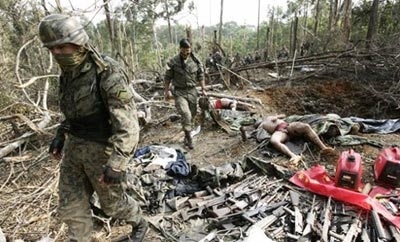At least 22 FARC guerrillas were killed by aerial bombardments against rebel camps throughout Colombia, in an assault that will test the guerrillas’ commitment to their unilateral ceasefire.
On December 1, an air strike on a Revolutionary Armed Forces of Colombia (FARC) camp in the province of Nariño near the Ecuadorian border left at least 20 insurgents dead, in the largest single blow against the guerrillas since peace talks began in October. Among the dead was the FARC’s regional commander, known as “Guillermo Pequeño.”
In the central province of Meta, the bombardment of a guerrilla camp killed at least one member of the FARC’s 27th Front, while a member of the guerrillas’ Jacobo Arenas Column died in an attack in the western province of Cauca.
On the day of the attacks, President Juan Manuel Santos placed a deadline for reaching an agreement in peace negotiations, telling the media that talks would not continue after November 2013.
InSight Crime Analysis
The assault reaffirmed the government’s policy of continuing to pursue the FARC militarily while negotiations are in progress, and put to rest any notion that they may hold back in response to the rebels’ unilateral ceasefire. It will also test the FARC’s resolve to maintain the ceasefire, especially given the scale of the casualties.
Santos’ announcement that the talks will not continue if there are no results after November next year is part of the government’s desire to be seen to be tough with the guerrillas, and not to allow them to use negotiations to build up their military strength.
It is likely that Santos is also thinking about the 2014 presidential elections. He has staked much political capital on the peace talks and their success or failure will have a huge impact on his chances of re-election. By ensuring talks do not drag on into the election year, he at least gives himself the chance to repair the damage of failed negotiations before the campaign gets underway. Nevertheless, it is unlikely he would bring talks to an abrupt end next November if a genuine breakthrough seemed close.

